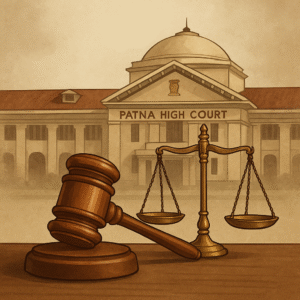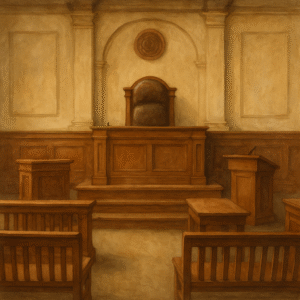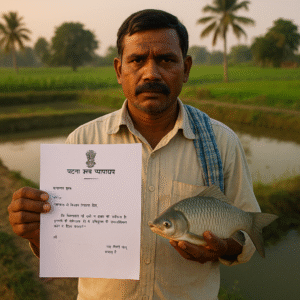Simplified Explanation of the Judgment
The Patna High Court recently decided a set of appeals filed by a state university against medical students accused of using unfair means during their MBBS Semester 2 examinations. The university had alleged that these students were caught with either handwritten notes (“chits”) or mobile phones containing stored answers while writing the exam. Based on the invigilators’ statements, the university’s Unfair-Means Committee cancelled their results and barred them from appearing in further examinations during the current session.
The students challenged this decision before a Single Judge of the High Court, arguing that no incriminating material was actually seized from them and that the invigilators reported the matter only after the exam was over. The Single Judge agreed, noting that the students were allowed to complete their papers, no physical evidence (such as chits or phones) was produced, and the committee’s findings lacked specific detail about which provision of the university’s regulations was violated. As a result, the Single Judge ordered the university to publish the students’ results.
The university appealed, relying on several Supreme Court rulings to argue that courts should rarely interfere with internal decisions of educational institutions in matters of exam discipline. They contended that invigilators sometimes avoid seizing items or stopping students mid-exam to prevent disruption and maintain order. They also claimed that absence of seized material should not undermine the committee’s decision.
The Division Bench (two-judge bench) of the High Court carefully reviewed the committee’s report and found it lacking in detail, reasoning, and evidence. The judges emphasised that while courts should respect internal academic discipline processes, allegations of unfair means are serious and require clear, specific findings. The committee had merely quoted a regulation and imposed punishment without specifying the exact offence committed by each student.
The court also criticised the invigilators’ fear-based approach of not taking immediate action in the exam hall, noting that avoiding confrontation to prevent possible disturbance cannot justify weak evidence or an incomplete inquiry.
The bench stressed that their decision was not based on sympathy for the students having already passed MBBS, but on the principle that disciplinary findings must inspire judicial confidence. They clarified that this ruling was specific to these facts and could not be treated as a blanket precedent for future cases.
In conclusion, the court upheld the Single Judge’s decision, directing the university to publish the students’ results. The appeals were dismissed without any costs.
Significance or Implication of the Judgment
This judgment highlights that while educational institutions enjoy autonomy in maintaining discipline, their disciplinary decisions must still be supported by clear, specific, and credible evidence. For students, it reinforces the right to a fair and reasoned inquiry when facing serious charges like cheating. For universities, it is a reminder that internal committee findings cannot be vague or purely based on delayed oral reports without physical evidence or direct observations. This case also sets a careful balance—courts will not replace the judgment of academic bodies but will intervene where the decision-making process is flawed.
Legal Issue(s) Decided and the Court’s Decision with Reasoning
- Whether the University’s Unfair-Means Committee’s decision could be sustained when based only on an invigilator’s delayed report without seizure of material evidence.
Court’s finding: No. The committee’s report lacked specific findings and failed to identify the exact regulatory violation. The delayed reporting and absence of seized items weakened the credibility of the allegations. - Whether courts should interfere with internal academic disciplinary decisions.
Court’s finding: Generally, no—but interference is justified where the report does not inspire judicial confidence, even without allegations of mala fides. - Whether allowing students to complete the exam affects the credibility of the allegation.
Court’s finding: Yes, in this case. The fact that students were permitted to finish the exam and no material was seized suggested lack of strong evidence. - Whether this judgment sets a precedent for all unfair-means cases.
Court’s finding: No. The decision is case-specific and cannot be used as a blanket precedent.
Judgments Referred by Parties
- Board of High School and Intermediate Education, U.P. Allahabad & Anr. v. Bagleshwar Prasad and Anr., AIR 1966 SC 875
- Prem Parkash Kaluniya v. The Punjab University & Ors., (1973) 3 SCC 424
- Controller of Examinations & Ors. v. G.S. Sunder & Anr., 1993 Supp (3) SCC 82
Judgments Relied Upon or Cited by Court
Same as above (referred and relied upon by court in reasoning).
Case Title
Aryabhatta Knowledge University & Ors. v. Various Students (Batch Matters)
Case Number
LPA No. 227 of 2020 with connected LPAs Nos. 226, 237, 241, 244, 247, and 252 of 2020
Coram and Names of Judges
Hon’ble Mr. Justice Ashutosh Kumar
Hon’ble Mr. Justice Jitendra Kumar
Names of Advocates and who they appeared for
For Appellants (University): Mr. Anand Kumar Ojha, Mr. Priyank Deepak, Mr. Awadhesh Kumar
For Respondents (Students): Not on record
Link to Judgment
https://www.patnahighcourt.gov.in/ShowPdf/web/viewer.html?file=../../TEMP/9ec09a7c-43a7-4385-9ee3-6f1e5b64a596.pdf&search=Debarment
If you found this explanation helpful and wish to stay informed about how legal developments may affect your rights in Bihar, you may consider following Samvida Law Associates for more updates.








